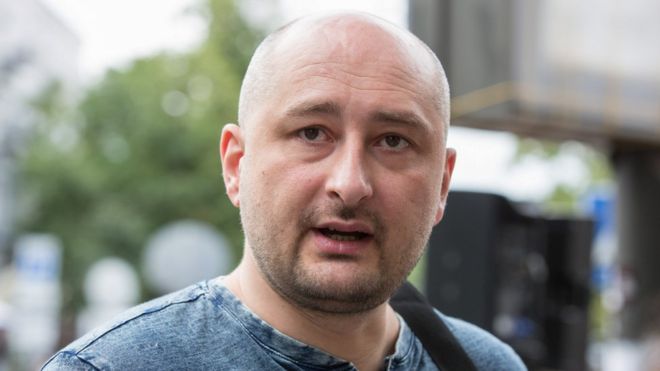KIEV/MOSCOW, (Reuters) – A dissident Russian journalist who was reported murdered in Kiev dramatically reappeared alive today in the middle of a televised briefing about his own killing by the Ukrainian state security service.
Ukrainian authorities had said on Tuesday that Arkady Babchenko, a 41-year-old critic of President Vladimir Putin and of Russian policy in Ukraine and Syria, had been shot dead at his flat and that his wife had found him in a pool of blood.
His reported murder touched off a war of words between Ukraine and Russia, a flurry of condemnations from European capitals and Washington, and shivers through the journalistic communities in both countries.

But today, an emotional Babchenko appeared before reporters saying he had been part of a special Ukrainian operation to thwart a Russian attempt on his life, and that he was fine.
“I would like to apologise for what you have all had to go through,” Babchenko, who looked on the verge of tears at times, told reporters. “I’m sorry, but there was no other way of doing it. Separately, I want to apologise to my wife for the hell that she has been through.”
Babchenko’s reappearance elicited gasps, then cheers and applause from journalists at the briefing.
He went on to thank the Ukrainian Security Service, the SBU, for saving his life and said the most important thing was that what he called other big acts of terror had been thwarted.
He did not specify what those planned acts were, but the SBU said it had received information about a plot to kill 30 people in Ukraine, including Babchenko, but had managed to prevent it. The security service declined to say who the other 29 people were.
It said it had detained a Ukrainian citizen recruited by Russia to find someone to kill Babchenko. He was given $40,000 to organise the murder, $30,000 for the killer and $10,000 for being an intermediary, it said.
“We managed not only to break this cynical provocation, but also to document the preparation of this shameful crime by Russian special services,” SBU chief Vasyl Hrytsak said.
General Prosecutor Yuriy Lutsenko, who appeared alongside Babchenko, said it was necessary to fake the journalist’s death so that the organisers of the plot to kill him would believe they had succeeded. The Russian Foreign ministry said today it was happy Babchenko had turned out to be alive after all, but said Ukraine has used his story as propaganda.
Babchenko, a Putin critic, has lived in the Ukrainian capital since receiving threats at home for saying he did not mourn the victims of a Russian military plane crash.
“Everything is over from yesterday,” Babchenko said. “I did my job and I’m still alive.”
Ukrainian Prime Minister Volodymyr Groysman said in a social media posting late on Tuesday he was convinced what he called “the Russian totalitarian machine” had not forgiven Babchenko for what Groysman called his honesty.
Moscow, which has been at odds with Kiev since a 2014 popular revolt in Ukraine that toppled a Russian-backed government in favour of a pro-Western one, described such allegations as part of an anti-Russian smear campaign.
“This is the height of cynicism against the backdrop of such a brutal murder. It is anti-Russian bluster instead of talking about the need to conduct a thorough, objective investigation,” Kremlin spokesman Dmitry Peskov told reporters before it was revealed that Babchenko was alive and well.
Babchenko sparked a backlash in Russia for his comments in a 2016 Facebook post on the military plane crash. He said his comments, in which he said he “didn’t give a damn” about the incident, had resulted in thousands of threats, his home address being published online and calls for him to be deported.
The plane, carrying 92 people, including dozens of Red Army Choir singers, dancers and orchestra members, crashed into the Black Sea on its way to Syria in December 2016, killing everyone on board.
